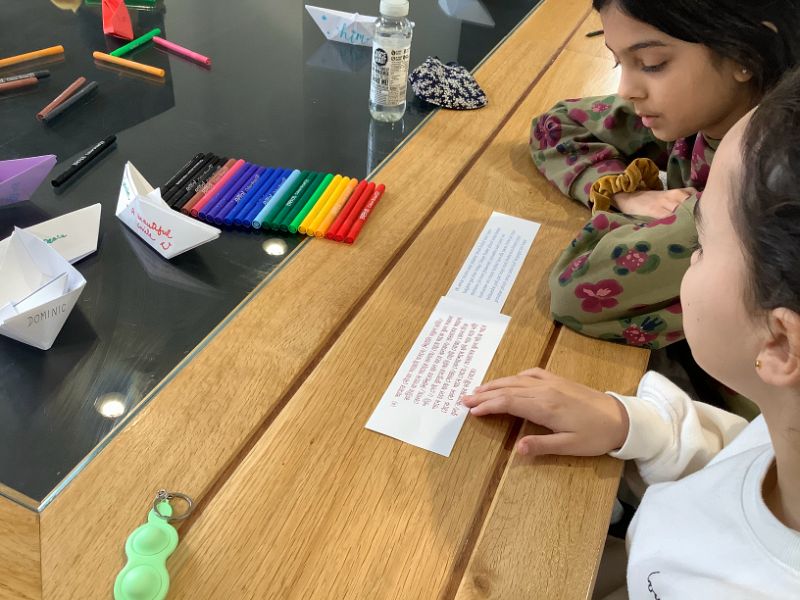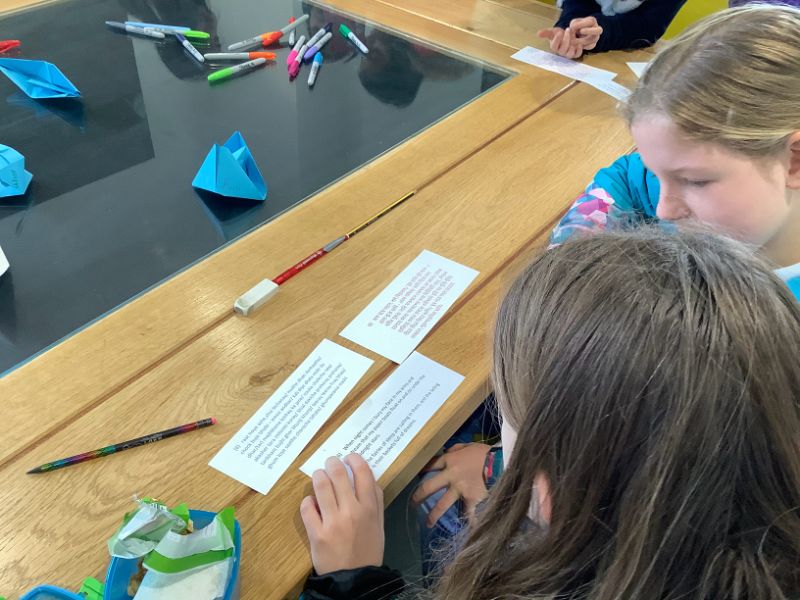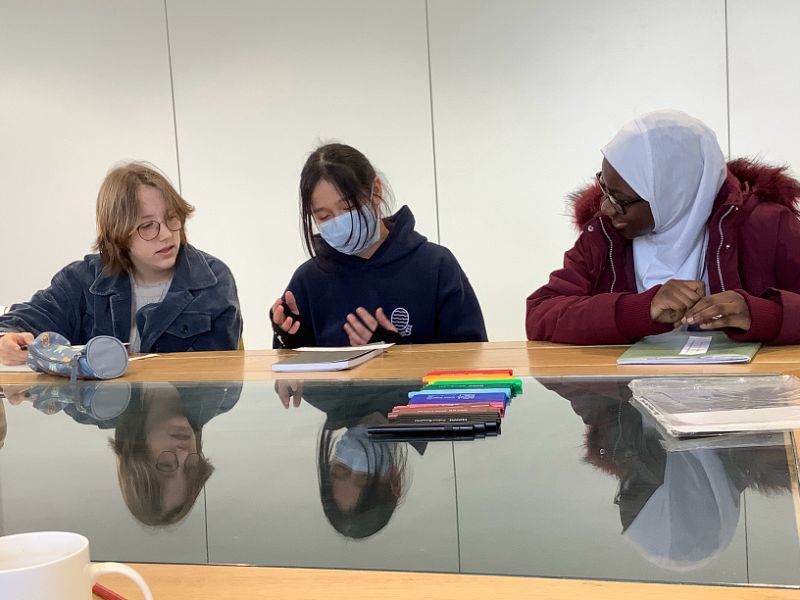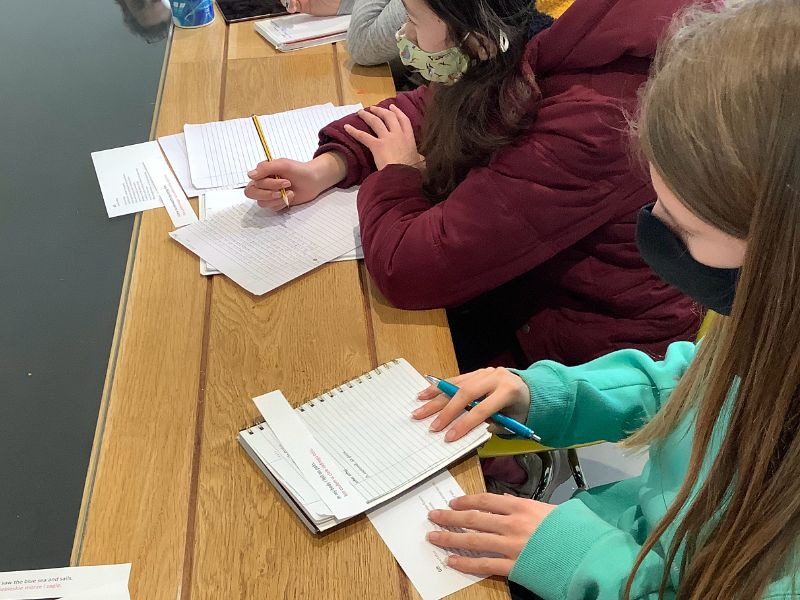05 February 2022
Posted by Beth McKeeman

Blaga Burogu Ibhulogi
Junior - 14 Young - 10
Hola! Bonjour! Kon'nichiwa!
It was a pleasure to be joined by Cheryl Moskowitz this week, a children’s writer and poem who works with translation.
Within both our groups we know to some extent a whole host of languages and as writers why should we limit ourselves to just the one?
We are influenced by all the languages and cultures around us, as the English language itself is. As is often quoted, English is a language that lurks in dark alleys, beats up other languages and rifles through their pockets for spare vocabulary. We find roots for words from latin, german, french, norse, japanese, indian, and so many more.
We started each session by thinking about what our own names mean, which often are influenced by languages other than English.
Do you know what your name means? Is there a particular significance to your family? Perhaps you want to try looking up the meaning of your name and pondering on whether it fits you. We have a lot of beautiful friends in our groups, which I think fits.
In the Junior Writers we used the work of Rabindranath Tagore to look at translation. He worked in both Bangla and English. Only Susmita could read the Bengali script but when she read it to us some were able to find familiar words and even more when the transliterated version (phonetically spelt out) was presented.
The Young Writers went through a similar process of going from a language none of us understood through to the English translation, though we started with the Germanic alphabet in this Polish poem by Czeslaw Milosz.
Although we didn’t speak Polish, we managed to assign the correct English word to the Polish with a remarkably high accuracy rate. It’s amazing how the language tree can aid us there. For the most part in the Young Writers group we were all familiar with languages on the European branch of the language family tree, where Polish also resides - French, Spanish, German, Albaninan, Russian. Somewhere in our brains, that knowledge helped us identify words in a completely foreign language to us.
We rounded out the session by writing a poem about A Time So Happy (or other good moment). The twist was that we had to include a second language in the poem.
To end this blog, some of our favourite words in any language:
Keshigome (rubber in Japanesse), Krasavita (beauty in Russian), Bonhomme de neige (snowman in French), Drôwle (fun in French), Oui, Bibliotechque (library in French), Pizza, Chicken Nuggets, Food, Gateau au chocolat (chocolate cake in French), Him (snow in Bengali), Sacapuntas (pencil sharpener in Spanish), Bhalobasha (love in Bengali).
Thank you very much to Cheryl for a fascinating session.
Junior Writers try to find meaning in Bengali script

Junior Writers try to find meaning in Bengali

Young Writers try to find meaning in Polish

Young Writers making happy dual language poems

Archive
Junior & Young Writers Week 3: Return From The Magical World
Junior & Young Writers Week 2: African Mythology
Problems, Problems, Problems...
Cautionary Tales & Christmassy Opening Lines
You've Gotta Have Pace, Pace, Pace
Junior & Young Writers Week 1: Alien Encounters
Junior & Young Writers: Week 5 - Play on Words Pt. 2
Junior & Young Writers: Week 11 - end of term showcase [build a bard workshop]
Junior & Young Writers: Week 10 - Greek Theatre - chorus stories
Junior & Young Writers: Week 9 - Greek Origin Stories - Spring
Rubber Ducks & Writing Festivals
Junior & Young Writers: Week 7 - Greek Hero Stories [the 12 labours of Hercules]
Junior & Young Writers: Week 12 [Wild Words] - Stuff & Things
Junior & Young Writers: Week 11 [Wild Words] - World Building 2
Junior & Young Writers: Week 10 [Wild Words] - World Building
Junior & Young Writers: Week 9 [Wild Words] - Mystery & Choose Your Own Adventure
Junior & Young Writers: Week 8 [Wild Words] - Spooky Sequels & Potion Poems
Junior & Young Writers – Week 10 (Writers’ Inspiration) – Final Showcase
Junior & Young Writers – Week 9 (Writers’ Inspiration) – Editing & Performance Tips
Junior & Young Writers – Week 8 (Writers’ Inspiration) – Cuteness
Time goes on by Tavinder Kaur New
Junior & Young Writers – Week 7 (Writers’ Inspiration) – Natural Solutions
Junior & Young Writers – Week 6 (Writers’ Inspiration) – The Language of Fruit and Veg
Junior & Young Writers – Week 5 (Writers’ Inspiration) – Adventures In Space
Tinklebobs and Bedraggled Angles
Junior & Young Writers – Week 4 (Writers’ Inspiration) – Our Environment
Fortune Tellers & Future Letters
Junior & Young Writers – Week 3 (Writers’ Inspiration) – Home
Young Writers - Week 10 (The Art of Writing) – Final Week Showcase
Junior Writers - Week 10 (The Art of Writing) – Final Week Showcase
Young Writers – Week 9 (The Art of Writing) – Choose Your Own Adventure
Junior Writers – Week 9 (The Art of Writing) – Choose Your Own Adventure
Young Writers – Week 8 (The Art of Writing) – Sequel Stories
Junior Writers – Week 8 (The Art of Writing) – Sequel Stories
Young Writers – Week 7 (The Art of Writing) – Picture Prompts
Junior Writers – Week 7 (The Art of Writing) – Picture Prompts
Young Writers - Week 6 (The Art of Writing) - Script-writing & Dialogue
Junior Writers - Week 6 (The Art of Writing) - Script-writing & Dialogue
Junior Writers – Week 5 (The Art of Writing) – Poetry
Young Writers - Week 5 (The Art of Writing) - Poetry Potions
Edward The Martyr - A Competition!
Mood Boards and Postcards from Space
Young Writers - Week 3 (The Art of Writing) - PLOT
Junior Writers - Week 3 (The Art of Writing) - PLOT
Moomin Stories and Hollywood Pitches
Young Writers - Week 2 (The Art of Writing) - Genre & Setting
Junior Writers - Week 2 (The Art of Writing) - Genre & Setting
Prompts, Dialogues, and Cliché
Story Structure Part One: Exposition and Beyond...
Young Writers - Week 1 (The Art of Writing) - Character
Junior Writers - Week 1 (The Art of Writing) - Character
Young Writers - week 4 - Nature Writing [animals & wildlife]
Junior Writers - week 4 - Nature Writing [animals & wildlife]
Young Writers - week 3 - Nature Writing [trees/plants/flowers]
Junior Writers - week 3 - Nature Writing [trees/plants/flowers]
Young Writers - week 2 - 'fractured fairy tales'
Junior Writers - week 2 - 'fractured fairy tales'
Young Writers - week 1 - 'from deep inside a forest'
Creating Communities through Writing
WORDCUP - Hounsdown Session #6
Making pillows in a house full of feathers
WORDCUP - Hounsdown Session #5
Exploring home – a place, person, house
WORDCUP - Hounsdown Session #4
Stories From Our Streets at the Abbeyfield Wessex Society Reminiscence Session at Poole Library
What Do You Really Mean? Writing Dialogue for Scripts
WORDCUP - Hounsdown Session #3
Character Building & Murder Mysteries
Going inside – from a spark to a story
WORDCUP - Hounsdown Session #2
Maybe I Can Be Invisible After All... Monologues
Creative Writing: Fun Facts, Diverse Voices and Different Perspectives
Writing Competition - Stories From Our Streets
Stories From Our Streets Community Activity Pack
Thinking in-quiet, after the fire
Found Cities, Lost Objects: Women in the City Curated by Lubaina Himid CBE
Ekphrastic Jukebox - Writing to Music
ArtfulScribe LitFest Community Showcase 2023
Young writers exercise their creative power
Writing to The Sorcerer's Apprentice
The Mousetrap - Mayflower Young and Junior Writers Investigate Mystery!
Stories From Our Streets Launch!
Interview: In Conversation with Dr Victoria Leslie
The Missing Farmer/ Blackout Poetry & DADA
Exploring this wonderful World
Using props to create characters/ working as a writing room
Stories of the Dust and Character Questions
Storytelling and Escalation or Rising Action
Junior Writers Club Acrostic Poem
Notes on Intention for MAST Collective - Year 3 - Facilitation Focus
Earthquakes & Dominoes - MAST Collective Blog #4
SUPER MARIO AND POP CULTURE POEMS
Receptionists & Inky Voids - MAST Collective Blog #3
Saying No and saying YES on National Poetry Day!
There's a Dragon in the Wardrobe...
House Warming Party (The Mortifying Ordeal of Being Known) - MAST Collective Blog #2
Intern Blog 5 - The Publishing Process
POEMS TO SOLVE THE CLIMATE CRISIS
On The Streets With Theresa Lola
Intern Blog 4 - The Internship Journey
NEW DIRECTIONS, STARTING SMALL - THE ORWELL YOUTH PRIZE
LIGHTHOUSES, HOPE AND METAPHORS
on workshop and transformations: frogs, lions, and the duck that becomes a larder...
Poetry Ambassadors - Interview with April Egan
Intern Blog 1 - Finding a Voice
World Poetry Day: Fluffypunk and the Invisible Women
On Being a Writer: A Conversation by Beth Phillips & Sam Morton
Poetry Ambassadors - Interview with Kaycee Hill
UNHEARD VOICES: INTERNATIONAL WOMEN'S DAY, AND STORIES OF CONFLICT













